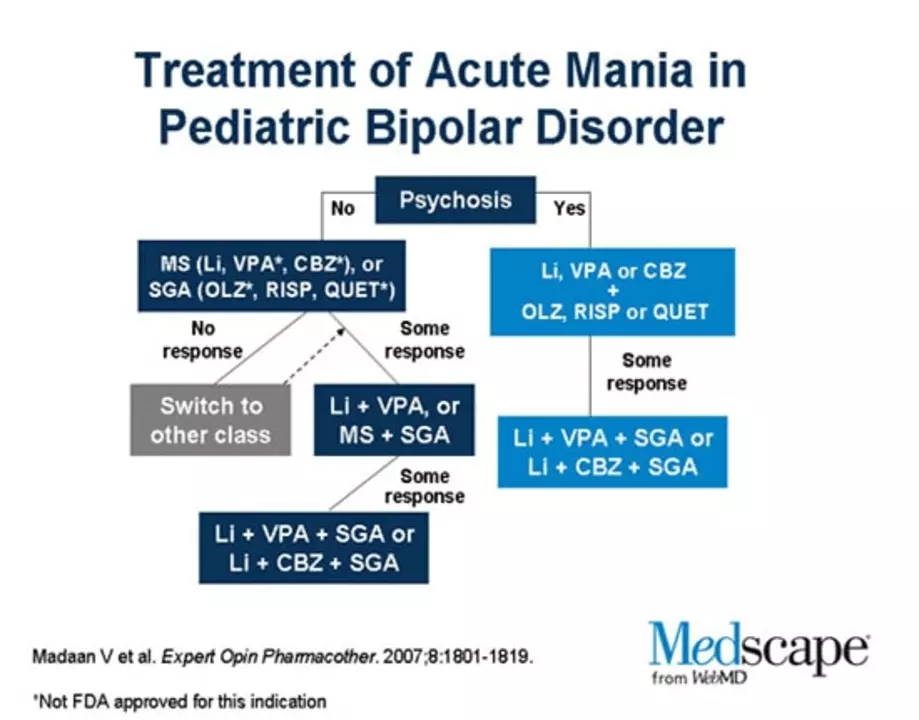Bipolar disorder: how to spot it, treat it, and stay safe with meds
Bipolar disorder means your mood can swing from very high (mania or hypomania) to very low (depression). Those swings affect sleep, thinking, work, and relationships. If you or someone close shows big mood changes that last days or weeks, don't shrug it off. This page gives clear, useful steps you can act on right away.
What to watch for
Mania or hypomania often looks like: sleeping much less but feeling full of energy, talking fast, racing thoughts, risky choices (spending, sex, driving), and overconfidence. Depression shows up as low energy, slow thinking, trouble getting out of bed, loss of interest in things, appetite changes, and sometimes thoughts of hurting yourself. Track patterns — note when mood shifts happen, how long they last, and what triggers them (sleep loss, stress, drugs).
If someone talks about suicide, or acts dangerously, get help now. Call emergency services, a crisis line, or take them to the nearest ER. A safety plan with contacts and steps to follow during crises is worth making before things escalate.
Treatment that actually helps
Treatment usually mixes medication and therapy. Common meds are mood stabilizers (lithium, valproate), some antipsychotics (quetiapine, olanzapine), and careful use of antidepressants with a mood stabilizer. Lithium is still one of the best options for preventing mood swings, but it needs regular blood tests. Valproate and carbamazepine work too, but they have specific side effects and checks.
Therapies that help include CBT (cognitive behavioral therapy), interpersonal and social rhythm therapy (which focuses on sleep and routines), and psychoeducation for families. Therapy teaches spotting early signs and handling triggers. Combine treatment with a consistent daily routine: regular sleep, meals, and activity make a big difference.
Medication adherence matters. Missing doses can trigger a relapse. Keep follow-up appointments, get lab tests on schedule, and tell your doctor about any side effects. If you plan pregnancy or are breastfeeding, talk to your doctor first — some bipolar meds can cause harm and need special management.
Be careful buying meds online. Only use licensed pharmacies that require a prescription. Fake or poor-quality drugs can be dangerous, interact with other medicines, or simply not work. If a site sells prescription drugs without asking for a prescription, walk away.
Practical daily tips: keep a mood log, stabilize your sleep (same bedtime and wake time), limit alcohol and recreational drugs, and share your plan with a trusted friend or family member. Join a support group — hearing others' experience helps you feel less alone and gives practical coping ideas.
Bipolar disorder is manageable with the right care. Stay connected with your healthcare team, watch for warning signs, and keep meds and safety plans up to date. If you’re unsure what to do next, call your doctor — small steps now can prevent bigger problems later.

Gabapentin and Bipolar Disorder: A Promising Treatment Option
May 5, 2023, Posted by Mike Clayton
In my latest blog post, I discuss the potential benefits of Gabapentin for treating Bipolar Disorder. This medication, originally used for epilepsy, has shown promising results in managing mood swings and preventing episodes of mania and depression. I delve into how Gabapentin works and share some recent studies supporting its effectiveness for Bipolar Disorder. However, it's important to note that it may not be suitable for everyone, and consulting a doctor is crucial. Overall, Gabapentin seems like a promising treatment option for those struggling with this complex mental health condition.
MORESEARCH HERE
Categories
TAGS
- treatment
- online pharmacy
- dietary supplement
- side effects
- generic drugs
- medication adherence
- medication safety
- health
- dietary supplements
- health benefits
- online pharmacy Australia
- generic substitution
- adverse drug reactions
- thyroid disorders
- gabapentin
- treatment option
- calcipotriol
- blood pressure
- erectile dysfunction
- closer look
